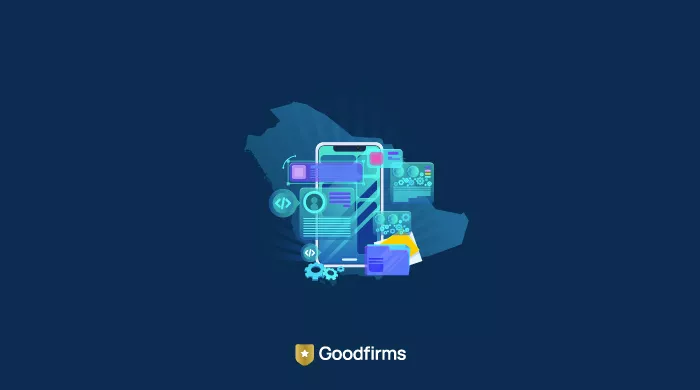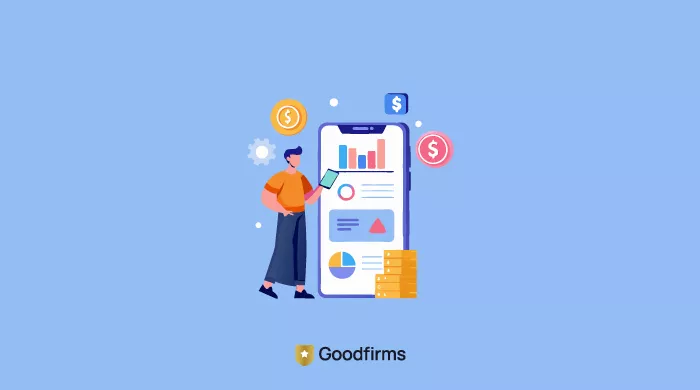Are you a business looking for mobile app development? Are you running short on time and low on budget?
If yes, then white label apps can be your ultimate solution.
White label apps are emerging as a much-needed helping hand for businesses running low on budget and with little time to spare. These apps can help your business scale by improving your online presence and service accessibility with a minimal investment.
In this era, having a mobile app is imperative for businesses, irrespective of their genres or size. Due to this, almost every industry today is hiring mobile app developers to represent their brand.
But one of the most popular options, custom app development, is often too expensive and time-consuming for businesses with little to spend. White label apps can be the best alternative for such companies.
Let’s dive deeper and learn more about white label apps and how they are helping businesses push their dream apps into the market in minimal time.
What Is a White Label App?
Usually, large tech companies assemble a whole in-house mobile app development team as their app development needs are not limited to one but revolve around developing various apps and their updates.
For example, gaming companies must release continuous updates for their running apps while working on new gaming apps.
For such businesses, in-house app development teams are feasible and affordable, but not all businesses have such extensive app development requirements. Such firms often outsource app development needs to app development companies or hire freelancers.
White label apps are emerging as one of the ideal options for businesses that need mobile apps developed faster on a minimal budget.
Some businesses need a mobile app to improve their brand visibility and allow customers to book or order services easily. For these types of companies, the whole operation doesn't revolve around mobile app development; instead, it's just a tool that makes their services known to a broader public.
In short, white-label apps are ready-made apps that these types of businesses can buy to accelerate their app development process and then customize and scale based on their requirements. It is a generic app that app development companies sell to businesses looking for a well-structured app for a minimal investment.
What Are White Label App Builders?
White-label app developers or development companies are often confused with white app development builders. While white-label app developers or development agencies are a team of professionals, white-label app builder is software for creating white-label apps.
Usually, these white-label app builders are used by white-label app developers and companies to create these apps, which are then sold to businesses looking for these apps.
Take a look at the infographic below to get to know more about white-label app builders.
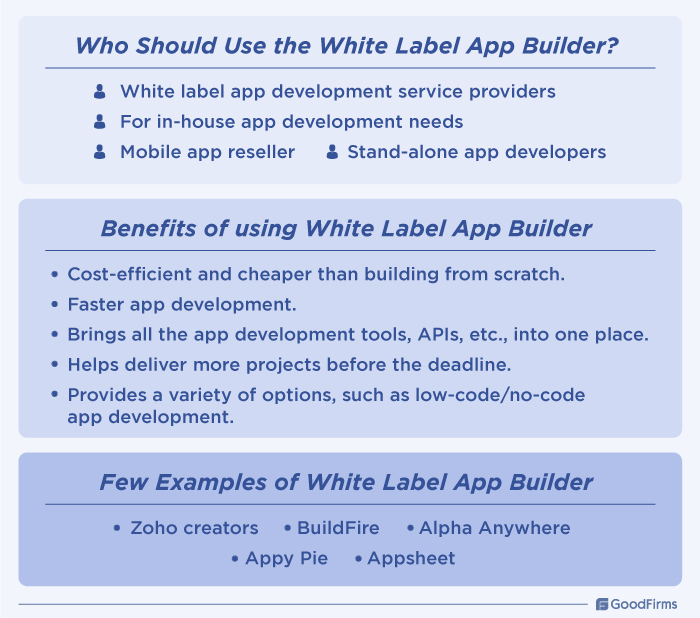
Let's discuss some of the features of white-label apps to understand them better.
Key Features of White Label Apps
To get to know white label apps better, learning their features and how they can help businesses reduce their app's time to market and launch them in minimal time and investment is essential. Let's look into some of the most defining features of white-label apps.
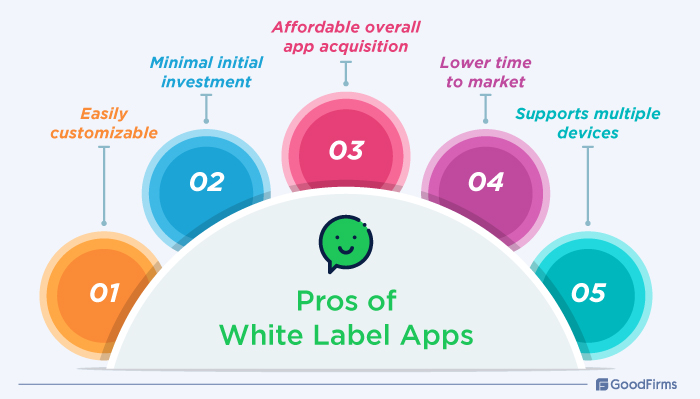
#1 Mass-developed and based on the same template
White-label apps are usually created in bulk or, say, multiple similar apps based on the same model are developed by the same app development company.
Assume that company X builds multiple tourism-based apps. These basic apps have pre-built features commonly found in travel and tourism apps and are sold to the relevant companies looking forward to buying them.
Further, assume that a travel company wants a mobile app to allow the public to use its services more comfortably, book online tickets, make online cancellations, etc. Such a company can go to any white-label app development company, such as company X and buy the pre-built basic travel and tourism app. These white-label apps can be further customized and branded based on the buyer company's needs.
To understand this better, let’s discuss a real-world example of white labeling.
You might have seen or maybe own merchandise of your favorite idol or tv show. Idol management companies or production houses do not manufacture these merchandise independently. Instead, they put their logos or graphics that best describe them on a generic product produced by a third party to make it look unique to the artist or the show and then sell it to fans.
In the same way, businesses in need of an app buy a generic white label app from white label app developers and then brand it to make it seem as developed by them.
#2 Easily Customizable
Once a company buys a white-label app matching its needs, they can easily customize it either by themselves or by asking the manufacturer to do so. Customizing these apps is incredibly easy and does not require any coding experience. Anyone with some design and branding knowledge can customize a white label app.
Usually, these apps come with a set of pre-built features and a template. But to make the app look unique as if it was custom built, designers can use a wide range of pre-built templates, which can be personalized based on the company's requirements.
#3 Low Initial Investment
I have reiterated this multiple times in the blog, but how exactly does a white label app make it possible for businesses to get an app with minimal capital? Let's check it out.
Compared to custom app development, white label apps don't require a high initial investment. Businesses with a limited budget, such as small businesses, can buy them for a small fraction of what they might have spent on custom mobile app development. These apps are cheaper because they are ready-made instead of custom-built from scratch. Hence require a minimum initial investment.
#4 Cost-Efficient
White label apps don't only require little initial investment but are also cost-effective. Compared to the custom app development cost, the overall cost that the buyer concurs with after acquiring a basic white label app and personalization are much less.
Building anything from scratch requires a substantial investment and several designated spendings throughout the development cycle. Also, building features from scratch, rigorous testing, and multiple interactions require a lot of money.
Compared to custom app development, customizing, adding features, and upgrading UI to match the branding needs are much cheaper and fit for businesses with little capital. Adding to this, buyers also need to pay a significant amount of money for regular maintenance in custom app development.
On the other hand, maintenance and updates are part of the package that white label app development companies provide to the buyer. Hence businesses don't need to pay any additional money to white label app developers for regular maintenance.
Based on the above discussion, it is easy to derive that buying white label apps is a more affordable option for businesses than custom app development.
#5 Lower Time to Market
For some businesses, driving their app faster in the market is essential to survive and compete with other rivals.
Let us assume you are running multiple sweet shop outlets in the city. Simultaneously there exists a competition, equally popular and running a dedicated mobile app. Its customers can quickly get their desired items delivered right to their doorstep.
A mobile app thus makes shopping from your competition more convenient for the public, thus giving it an edge over your business.
In such circumstances, to enter the online market at the earliest, investing in white label apps can be an ideal choice for you. As these apps are pre-built, with just a few design changes and extra features, your app can be ready to enter the market.
This way, white label apps reduce the time to market by reducing the overall app deployment time.
#6 Supports Multiple Devices
White label apps are generally built focusing on their multi-platform operability. Usually, when a business wants to opt for custom-app development for multiple platforms, they must pay a considerable amount for every platform. Such is not the case when a company decides to buy white label apps.
Most white label app developers build apps that have multi-platform operability. Hence when a company buys a white label app, they can get their hands on an app already built for multiple platforms in an affordable package.
How Much Does It Cost to Develop White Label Apps?
The overall white label app development cost can vary based on the app provider, the number of features, the framework used, app complexity, and all such parameters. Based on our research, the approximate development cost for white label apps can range from less than $5000 to $100,000+. Only the most sophisticated white label apps cost more than $50,000.
Hence, businesses looking for a standard app with decent features can get a white label app under an overall development cost of $5,000 to $20,000. At the same time, a medium-sized white label app might cost you from $20,000 to $50,000.
Some Drawbacks of White Label Apps
As they say, nothing is perfect in this world, and everything comes with its own set of pros and cons. The same is the case with white label apps. If they bring some pros for businesses, they simultaneously come with their own set of drawbacks.
Let's look at some of the cons of white label apps.
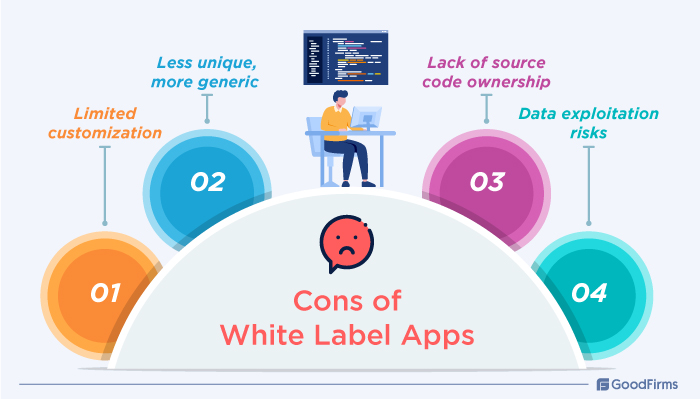
#1 Limited customization
One of the most severe drawbacks of white-label apps is limited customization. Compared to custom mobile app development, white label app providers offer limited personalization to the buyers. As these apps are generic and mass-built, it consists of limited features that are enough for the effective functioning of the app.
White label app providers allow businesses to customize their apps based on their business's branding needs. But the way and extent to which you can customize apps in custom app development is not possible with white label apps.
The reason is that adding more sophisticated features will need the entire code alteration, which is time-consuming and costly. Moreover, white label app providers usually do not allow customization over a specific limit.
#2 Less unique
Again, if you are a business owner looking forward to building a unique app with a UI/UX like no other, a white label app can not be an ideal choice.
I have reiterated throughout the blog that these apps are generic apps produced in bulk. Hence you can customize the app with a little bit of branding, but it might look similar to many other apps, especially ones sold by the same developer.
#3 No Source Code Ownership
Most businesses buying white-label apps do not have access to source code files. Even when they do, they may not be able to implement changes based on their preferences.
White-label developers usually maintain source code ownership even after selling the app.
Hence businesses, unlike custom apps, do not have ownership of the white label apps, thus making them dependent on the white label service provider for any change they need to make in source codes.
#4 Data Exploitation Risk
As discussed, white-label app developers maintain the source code ownership even after selling it to businesses. And with the ownership, these developers may have access to all the data that your app collects.
Your customers and all their sensitive information cannot be thus classified as fully confidential. And if you have not chosen a credible white label app provider, your business can face many security threats and data exploitation risks. This will not just harm your business and its credibility but will also harm your customers.
Hence it's crucial to choose wisely the white app developer or white label app development company before buying an app fit for your business.
Why Opting for White Label Apps Can Be the Right Pick for Your Business?
White-label apps might not be a perfect fit for every kind of business. But there are some businesses for which it is ideal and can act as the best, most affordable, and less time-consuming way of getting their dream app into the market. Let's discuss some businesses for whom investing in white label apps can be a great choice.
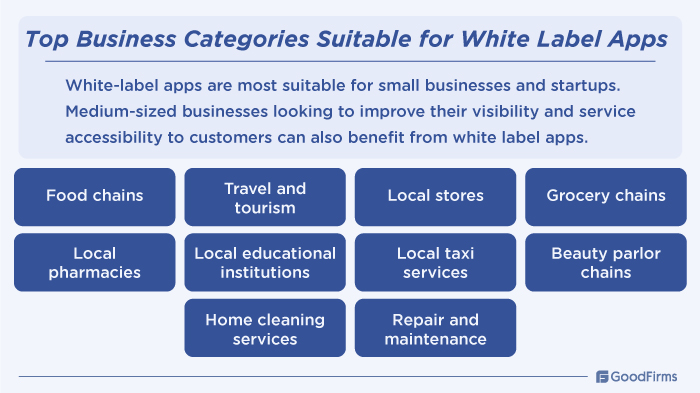
Custom App Development vs. White Label App Development
As we move towards the end of our discussion on white label apps, let us summarize the key differences between custom app development and white label app development that were highlighted in this post.
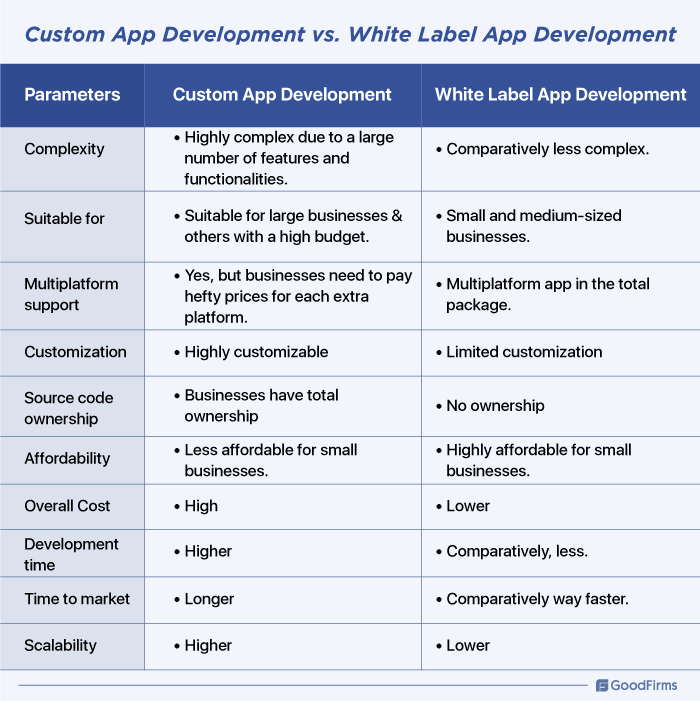
Wrapping Up
It's becoming essential for businesses worldwide to invest in an app that helps make their services more accessible to their customers and make their business known to more people. Custom app development is usually expensive; not every business can afford it. White label apps are a commendable and cost-efficient solution for such companies.
White label app development companies sell a pre-built app matching the buyer's needs. The buyer can customize this app using pre-built templates and other features provided by the app development company to make it look unique, as if it's custom-built just for the brand.
White label apps are ideal for small and medium-sized businesses looking forward to scaling and improving online visibility. In this post, we discussed several pros and cons of white-label apps that companies must know before investing to ensure they opt for the right services.




.jpg)
